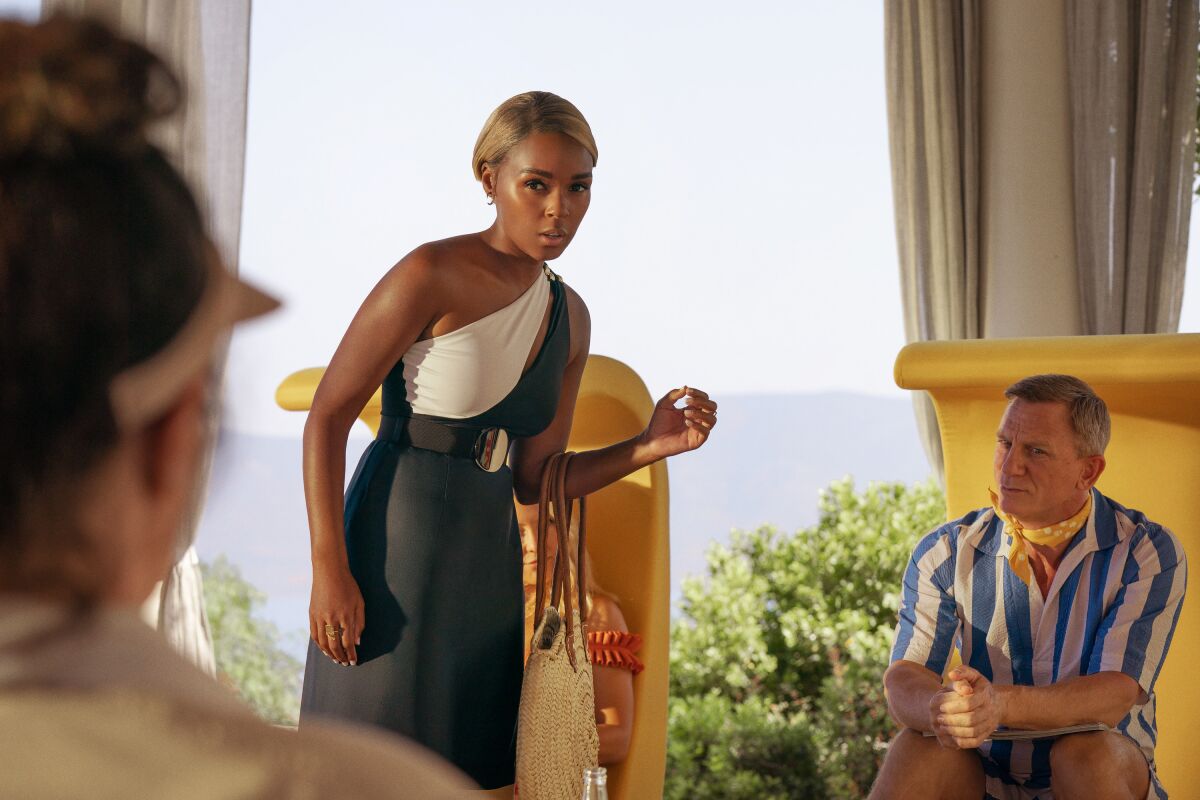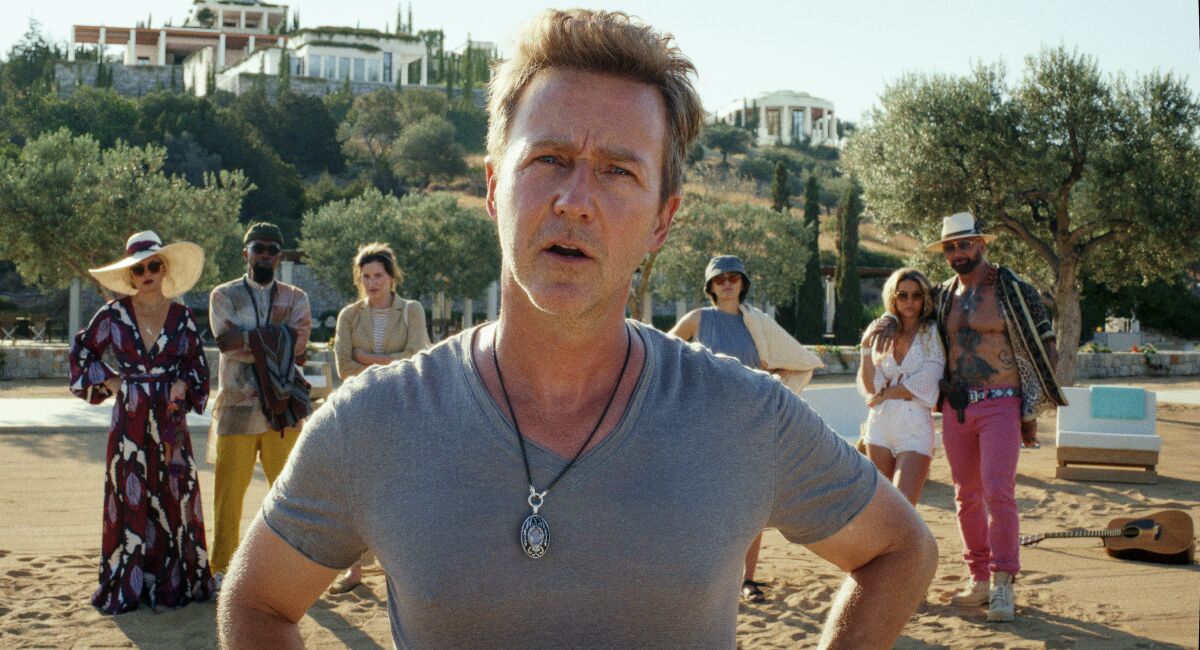Janelle Monáe explains how ‘Glass Onion’ created twists hiding ‘in plain sight’
Warning: Spoilers for “Glass Onion: A Knives Out Mystery” ahead. Do not read unless you want to know who dies and who the killer is.
It’s right there in the title, then explicitly stated during the movie: “Glass Onion: A Knives Out Mystery” is a movie with layers. Layers that somehow manage to reveal and conceal in equal measure, as writer-director Rian Johnson and his cast unveil surprise after surprise.
In the film, tech billionaire Miles Bron (Edward Norton) invites a group of old friends to his private Greek island for a weekend-long murder mystery party at which he will be the victim and they will solve his (pretend) death. Among his guests — played by Kate Hudson, Kathryn Hahn, Dave Bautista, Leslie Odom Jr., Jessica Henwick and Madelyn Cline — are unexpected faces. One is world-renowned detective Benoit Blanc (Daniel Craig, reprising his role from “Knives Out”); the other is Andi Brand (Janelle Monáe), a former partner who recently lost a contentious lawsuit against Bron.
One of the most inventive and playful aspects of the film is the way in which “Glass Onion” reveals itself to be much more than a whodunit. It also revels in the question of who gets killed. “ The mystery is not the thing that’s going to keep the audience in their seats,” Johnson explained in an interview earlier this fall. “The mystery is, in a way, set dressing and the reality is that the audience is going to experience this and the narrative sitting in their seats as a movie, and that’s how you have to make the thing tick. That’s how the machine has to actually work.
“And so I’m thinking in terms of sequences and what drives it forward and the mystery kind of weaves its way throughout,” Johnson said. “But the notion that these movies, or that any whodunit thing is actually a puzzle the audience can solve, is completely an illusion. The reality is these are roller-coaster rides, or the best ones are, and they need to function first and foremost as a fun time in the theater. You have to be leaning forward, not leaning back and stroking your chin and trying to figure it out.”
Having premiered at the Toronto International Film Festival and receiving an unusual one-week-only theatrical release around Thanksgiving, “Glass Onion” is now reaching its widest audience yet streaming on Netflix.

Janelle Monáe and Daniel Craig in “Glass Onion: A Knives Out Mystery.”
(John Wilson / Netflix)
Here’s where the spoilers come in.
At first it appears that the mystery will revolve around the death of one of Bron’s guests, Duke Cody (Bautista), who dies suddenly when he accidentally drinks pineapple juice, to which he is severely allergic. But it’s soon revealed that the woman the party attendees think is their old friend Andi is actually her twin sister, Helen, who is there to solve Andi’s recent, not-yet-public murder with the aid of master sleuth Blanc. As the revelations pile up, we learn that Bron is the film’s true villain: A rapacious, not-as-bright-as-he-seems robber baron whose unchecked ego and ambitions lead to his spectacular downfall. (Perhaps that part sounds familiar.)
The twist that Monáe is in fact playing two roles as Andi and Helen comes partway through the film — and as Monáe explained in an interview this week, it was as much a surprise to her when she first read the script as it is to viewers.
“When I was reading it, I had no clue,” said Monáe, despite the fact that she and Johnson had previously conversed about the project via Zoom. “And so when I got to the twist and when I got to the character and the energy he wanted me to play, I was blown away.”
As for the challenge of playing two parts, Monáe said, “I used to think of them as two characters, Helen and Andi, but in talking with Rian I essentially was playing three characters: I was playing Helen and I was playing Andi and I was playing Helen pretending to be Andi. Rian even says, like, a fourth one. So I had to keep at least three to four different notebooks.”
Costume designer Jenny Eagan, who also worked on “Knives Out,” spoke about outfitting Monaé as the separate characters of Helen and Andi, as well as Helen portraying Andi.
“There’s this presenting oneself with, ‘I’m OK. I’m still fine,’ and then we step back and we think, ‘Well, this is Helen pretending to be Andi, so maybe then you get a little bit into this is how Helen sees her sister,” Eagan said. “It might not have been what Andi wore, but it probably was owned by Andi. I’m sure Helen went into her closet and took those clothes. And then we get to Helen. She’s a schoolteacher, she’s grieving, and she’s on a quick trip, so there’s not a lot for her to bring.”
For Monáe there was a simple way to distinguish between the sisters.
“The distinction between the two, Andi and Helen, is really all about the voice,” Monáe said. “[Andi] is a very powerful, successful woman who is in a room full of sharks and tech bros every day. And there is some sort of performance that she has around what power looks like.
“She has a voice that just sounded like power. You didn’t know where she was from. And she always thought that keeping her Alabama accent would make people think she wasn’t smart or that she was country. She was very insecure about that. But her sister Helen, who remained with her voice from northern Alabama, is absolutely smart. As you see who she is over the course of this film, both of them are brilliant within their own right, but one of them didn’t have to assimilate to prove that.”

Edward Norton, foreground, with, from left, Kate Hudson, Leslie Odom Jr., Kathryn Hahn, Jessica Henwick, Madelyn Cline and Dave Bautista in “Glass Onion.”
(Netflix)
One of the movie’s subtlest jokes is a flashback in which Norton’s character wears a maroon shirt under a black leather vest with his long-ish hair pulled back into a short ponytail. It is an imitation of an outfit worn by Tom Cruise in the 1999 Paul Thomas Anderson movie “Magnolia” as the men’s-rights motivational speaker Frank T.J. Mackey.
“Edward was so genius in the beginning, saying Miles Bron has never had his own idea in his life, he looks at everyone else for inspiration or exact copying,” Eagan said. “Imitation is his game. It’s all kind of those people he’s looking up to and he assumes that he can be. It’s so on the nose, so ridiculous: Who does this guy think he is?”
A long sequence that plays out poolside at Bron’s estate is seen once before audiences know the truth about Helen’s identity and then is seen again once the perspective has shifted, with the performances playing out differently.
Newsletter
The complete guide to home viewing
Get Screen Gab for everything about the TV shows and streaming movies everyone’s talking about.
You may occasionally receive promotional content from the Los Angeles Times.
“I didn’t quite understand it when he was asking us to do it in different ways,” Monáe said of Johnson’s direction. “I knew that we had to do the flashbacks and the POVs and all of that, but when you’re just doing them as stand-alones and you haven’t seen the film edited, you don’t know how it’s going to land.”
As of now, Monáe has seen the film eight times and is still making discoveries.
“When you watch it and you watch that first act, it’s all right there, in plain sight,” Monáe said. “I’m like, ‘Rian, you sneaky, sneaky boy.’ But it’s supposed to throw you off. Spoiler alert … if you watch it that second or third time, you’ll see exactly when the killer takes the gun and where the killer puts the gun and puts the glass and all of those things.
“It’s like you think that you’re so smart as the person watching it and you’re like, ‘How the hell did I miss that?’” Monáe said. “You want to keep replaying it just to make sure Rian’s not playing tricks on you. He’s playing tricks and he’s also being honest at the same time.”

“It’s like you think that you’re so smart as the person watching it and you’re like, ‘How the hell did I miss that?’” Monáe said of “Glass Onion.”
(John Wilson/Netflix © 2022)
Alongside cameos by the likes of Yo-Yo Ma, Serena Williams, Stephen Sondheim, Kareem Abdul-Jabaar, Natasha Lyonne and Angela Lansbury, Hugh Grant appears as Benoit Blanc’s live-in partner. In a brief moment in the film, Helen first comes to the door of Blanc’s apartment and Grant is the one who answers. Except Monáe didn’t know that when she shot her side of the scene, because Grant wasn’t there.
“It was a surprise for me too,” Monáe said. “It’s so funny, we were not in the same place shooting that, so essentially Hugh was probably talking to a stand-in and I was talking to, I think Rian was on the other side of that door.”
Monáe described the finale, when Helen is revealed to the group, Bron is unveiled as Andi’s killer and Helen then smashes all the glass figurines in Bron’s opulent living room before burning down his estate, as “cathartic.” Still, she explained, the mayhem required meticulous choreography.
“I remember thinking about Bugs Bunny and the Joker, just this moment where Helen is showing up to avenge her sister’s death and she has nothing to lose,” Monáe said. “I wanted to take people on a ride with her. It felt so good and it was so fun. I always just say I felt like a theater kid, a big kid making movies with my theater-kid, thespian friends and never wanting to go home.”

Janelle Monáe in “Glass Onion.”
(John Wilson/Netflix © 2022)
Since the movie has launched on Netflix and been seen by a wider group of people, it has inspired some criticism from those who don’t care for its satirical critique of the “move fast and break things” ethos of tech-bro culture.
“Like Nina Simone says, an artist’s job is to reflect the times,” Monáe said. “And I think that’s what Rian is doing, he’s reflecting our times in the same way that Agatha Christie was reflecting her times when she was making her mysteries. And for me, and I think I can say this for Rian, we never want to talk over the art. It’s great that people are talking about it or saying who they think it’s for or it’s pissing people off or making people laugh. That is what art is supposed to do and I love it.”
For all the latest Entertainment News Click Here
For the latest news and updates, follow us on Google News.
